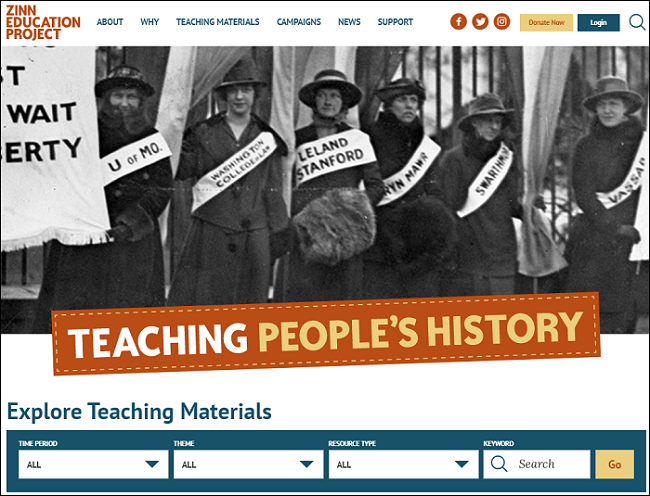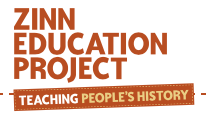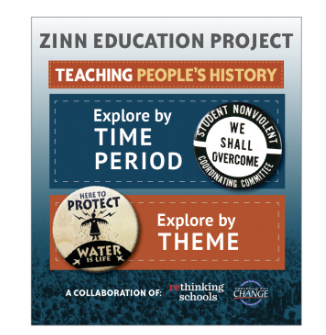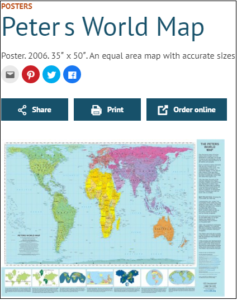- MN ABE Connect
- Archive
- Teaching Critical Thinking Skills through a Social Justice Lens
 September 21, 2020
September 21, 2020
Teaching Critical Thinking Skills through a Social Justice Lens
Stephanie Sommers, ACES CoordinatorWhat a year 2020 has been so far. We have been navigating a worldwide pandemic, experiencing a racial injustice reckoning, and watching a presidential campaign that will shape our future. It is safe to say that 2020 has left us with a lot to unpack as individuals and as educators.
As our classes continue to look so different as they take place online, I am thinking about the need to find and use materials that help my students and me to process everything that is going on around us. I want to find materials that will help us to put current events into a historical context, and will help us to process the information that we receive through a critical lens. I want to explore issues of inequality and power, and I want my students to know that “We the people” have a voice in shaping our collective future.
 In my search to find teaching resources that would help me to reach these goals, I found the Zinn Education Project (https://www.zinnedproject.org). The resources in this vast collection are influenced by the work of historian Howard Zinn, who is well known for his book A People’s History of the United States. The collection is a collaboration between Rethinking Schools and Teaching for Change.
In my search to find teaching resources that would help me to reach these goals, I found the Zinn Education Project (https://www.zinnedproject.org). The resources in this vast collection are influenced by the work of historian Howard Zinn, who is well known for his book A People’s History of the United States. The collection is a collaboration between Rethinking Schools and Teaching for Change.
It includes, among other things, posters, audio clips, film clips, songs and poems, and PDF copies of teaching materials. The materials very clearly relate to Social Studies topics and would be an excellent addition to any Adult Diploma teacher’s toolbox. However, they could also be used to craft rich, relevant units of instruction around a line of inquiry that would allow learners to explore these topics through reading, writing, speaking and listening, and deep critical thinking activities.
 In the Transitions Integration Framework (TIF), Skill 4 within the Critical Thinking category requires learners to recognize bias, assumptions and multiple perspectives. The resources in the Zinn Education Project are perfect for building this skill, and for this reason it is the latest edition to the ACES resource library in the Critical Thinking category.
In the Transitions Integration Framework (TIF), Skill 4 within the Critical Thinking category requires learners to recognize bias, assumptions and multiple perspectives. The resources in the Zinn Education Project are perfect for building this skill, and for this reason it is the latest edition to the ACES resource library in the Critical Thinking category.
While the resources in the collection are all free, users do need to create an account in order to access them. After that, it’s just a matter of diving in to explore. There are a lot of teaching materials in the collection, but you can search them by time period, by theme, or by resource type.
Examples of activities
While searching by resource type, I started looking through the poster collection. I found something called the Peters World Map that I found very interesting. I’ve never spent much time thinking about maps and how they are drawn. If I had, I might have noticed that on some maps South America is drawn to appear smaller than Europe, when it is really more than twice Europe’s size.
 The Peters World Map is an equal area map, so it shows countries and continents according to their actual size. The map can be shared, downloaded and printed, or ordered online. Right away I started thinking about how it could be used in class. Perhaps an image of the map could be shared during a virtual class session and students could share where they come from. It would make a great prompt for a notice-and-wonder type activity where students think about how we view the world and what we know, and don’t know, about different regions. I think it could also be used as the basis for a quick write activity in which students reflect on where they would really like to visit and why.
The Peters World Map is an equal area map, so it shows countries and continents according to their actual size. The map can be shared, downloaded and printed, or ordered online. Right away I started thinking about how it could be used in class. Perhaps an image of the map could be shared during a virtual class session and students could share where they come from. It would make a great prompt for a notice-and-wonder type activity where students think about how we view the world and what we know, and don’t know, about different regions. I think it could also be used as the basis for a quick write activity in which students reflect on where they would really like to visit and why.
Some of the other resources that stood out for me come from the PDF copies of teaching materials section. There are several role play and mixer activities that encourage students to explore issues from different points of view. Several of these activities relate to issues surrounding clean energy and climate change; “Blockadia: Teaching How the Movement Against Fossil Fuels is Changing the World” and “The Climate Crisis Trial: A Roleplay on the Roots of Global Warming” are two activities that look especially engaging. My writing teacher’s brain thinks these activities could be used as a lead in to helping students craft an argument essay about climate change, but they could also be used to develop speaking and listening skills in a class where students might be working up to delivering an oral presentation or poster session.
During this election year, I was also intrigued by something called “Constitution Role Play: Whose ‘More Perfect Union’?” and “Who Gets to Vote? Teaching about the Struggle for Voting Rights in the United States.” Several of the role play activities include multiple perspective texts for students to read and then guided questions that help them to think about the issue from different points of view.
Adapting materials to various levels
I will caution that some of the texts are dense and the materials overall seem to be geared towards middle and high school level students, but I think they could be scaled back and adapted without too much effort. I would also argue that the activities that are presented provide a great framework and inspiration for teachers who want to create engaging, dynamic lessons with lower level materials. Seeing how the role plays are structured, for example, would allow a teacher to create a similar activity using different scenarios. I can imagine creating one in which students explore the protests that occurred after the death of George Floyd from multiple perspectives. To help create my role play activity, I could use the “How to – and How Not to – Teach Role Plays” guide that can found in the collection.
In conclusion, the Zinn Education Project provides educators with a large number of tools that can be used to teach from a social justice perspective, and there has never been a better time to use them.
Originally published 9/21/20
Newsletter Signup
Get MN ABE Connect—the official source for ABE events, activities, and resources!
Sign UpArticle Categories
- ABE Foundations/Staff Onboarding
- ACES/Transitions
- Adult Career Pathways
- Assessment
- CCR Standards
- Citizenship
- COVID-19
- Cultural Competency
- Digital Literacy/Northstar
- Disabilities
- Distance Learning/Education
- ELA
- Equity/Inclusion
- ESL
- HSE/Adult Diploma
- Listening
- Math/Numeracy
- Mental Health
- Minnesota ABE
- One-Room Schoolhouse/Multilevel
- Professional Development
- Program Management
- Reading
- Remote Instruction
- Science
- Social Studies
- Speaking/Conversation
- Support Services
- Teaching Strategies
- Technology
- Uncategorized
- Volunteers/Tutors
- Writing